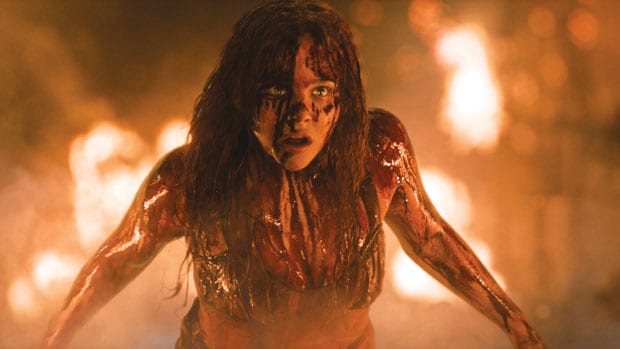Brian DePalma’s 1976 film Carrie is most memorable now, nearly four decades later, for three things. 1. Its campy sense of humor. 2. A twist ending that rattles you. 3. A dreamy opening sequence where teenager Carrie White, innocently but joyously exploring her body in a high school locker room shower, experiences her first menstrual cycle, panics, and becomes a laughing stock of the cool girls in her class.
In the new remake, director Kimberly Peirce pushes the shower sequence back a little bit, instead opening with an even bloodier sequence: Carrie’s birth, as horrific as the one from Breaking Dawn.
It’s a fitting metaphor for all of the disturbing, bloodsoaked imagery that Peirce and screenwriters Lawrence D. Cohen and Roberto Aguirre-Sacasa conjure in this creepy but fitting take on a classic of modern horror. They hardly need to fiddle with the formula, and they don’t — King’s story is an almost elegantly simple tale of teen angst built around the microcosm of prom night. A little YouTube, some more explicit lesbianism, and we’re good.
But that’s Carrie’s curse: The filmmakers cleave so close to the source, the film can frighten but it cannot surprise. It’s effective but less stylish than DePalma’s split screens. Peirce, instead, uses multiple angles during the “drenching” scene, and it plays more like homage than a reimagined take on the original.
Peirce is no stranger to violence and humiliation against teenagers. She cut her teeth with the Oscar-winning drama Boys Don’t Cry, and her Carrie, appropriately updated to 2013, takes on a subtext of bullying that gains potency in a post-Tyler Clementi America.
Chloe Grace Moretz, among the most self-possessed of child actresses (she plays the ballsy superheroine Hit-Girl in the Kick-Ass movies) projects Carrie’s skittish fragility well — perhaps too well, as there’s little development in her character in the first half. That changes when hunky teen Tommy (Ansel Elgort) invites her to prom, and Carrie blossoms. Sissy Spacek’s prom queen always seemed awkward and deluded; Moretz gives Carrie the promise of fitting in, only to have that ripped away from her. (Julianne Moore’s crazed, fanatical Mrs. White has less of the spoof about her than Piper Laurie did, which makes her slightly more terrifying.)
If nothing else, this Carrie proves that King tapped into something universal about teen thoughts of revenge and justice. Who’d’ve thought the tale was so timeless?
Two-and-a-half stars. Now playing.
















